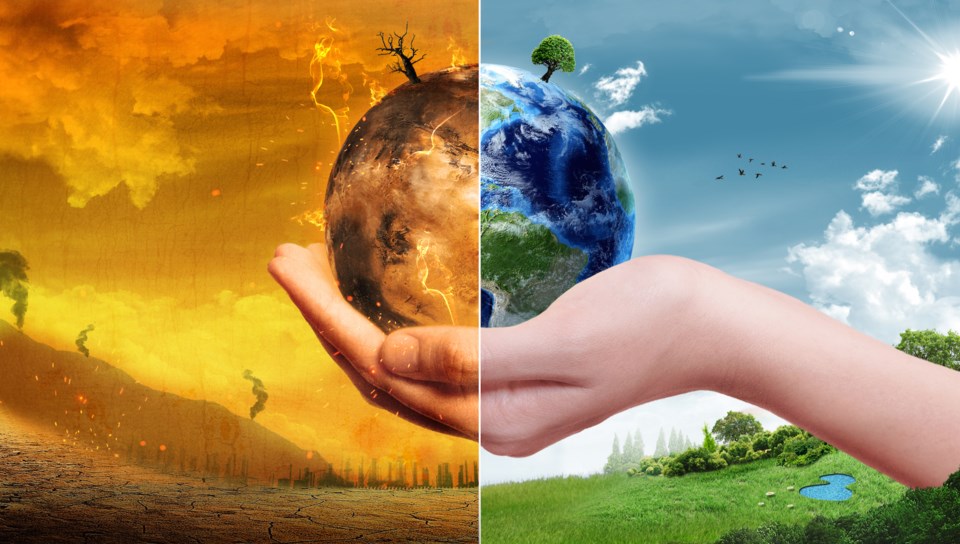It's worth a daily reminder: When markets are up, the environment is down
Many Canadians listen to the radio every morning and, as sure as the sun rises, we’ll hear the stock market report every weekday. Sometimes it’s up, sometimes it’s down, and some days it’s not moving much at all. And if you’re not listening to radio or watching TV, most newspapers will give you the same message, every morning, usually on the front of the business section.
In our world, “up” is usually associated with “good” while “down” is bad. Our moods fit this categorization; we might say “I’m on top of the world” when happy or “I’m in the pits” when feeling low. The phrases “I’m up” or “I’m down” need no further explanation.
The same goes for market reports. When the markets are up, the unstated message is that we should feel good; the economy is strong and things are looking up! When the market is not moving, well, tomorrow is another day, and there might be some market growth. When the market is down, that’s alarming. And when the market stays down, that is really not good at all.
But not everything that is up is good; cancer cells are stellar exemplars of growth, but when cancer is “up,” that’s not good for the patient. Some of us struggle with weight gain, and a rising number of pounds on the scale is not better. When interest rates are up, that’s great for those with money in the bank, but terrible if you’re paying off a large mortgage.
Is burning more carbon good?
A major issue in Canada right now relates to the growth of the oil and gas industry.
The world’s economy seems to be driven by the burning of carbon-based fuels, and Canada today seems to be divided on the issue of whether we should encourage the burning of carbon or discourage it. Our economy, some leaders tell us, is going to be down unless we put more carbon up into the atmosphere; burning more carbon will lift the economy and if we don’t, we’re heading for a depression.
However, the recent Intergovernmental Panel on Climate Change Special Report notes that, due to the growth in the burning of fossil fuels:
“Human activities are estimated to have caused approximately 1.0C of global warming above pre-industrial levels, with a likely range of 0.8C to 1.2C. Global warming is likely to reach 1.5C between 2030 and 2052 if it continues to increase at the current rate….”
Because we can’t see carbon dioxide, the continued use of the atmosphere as a cesspool is only revealed through daily monitoring, since the late 1950s, by the late Charles Keeling and his colleagues at the Mauna Loa Observatory in Hawaii.
While the Mauna Loa data is nothing like the Dow Jones or TSX indices, I think we can use the accumulation of CO2 in the atmosphere as an indicator of how we are doing in managing the global commons. When the daily CO2 report is greater than the measure for the same day in the previous year, the quality of the world’s environment is down. CO2 in the atmosphere has a seasonal periodicity, so during the late spring and summer months in the northern hemisphere, the actual amount of CO2 in the air goes down, only to rise again in the fall and winter, thus year over year comparisons are the relevant ones.
Weather is nature, global warming is economic
Global warming and climate instability are the outcomes of our economic system’s activity. What happens to our weather on a daily basis is due to atmospheric physics; what is happening to climate is due to the global economy.
Indeed, greenhouse gas emissions are closely tied to national gross domestic product numbers. As Dalhousie University researchers Larry Hughes and Ayesha Herian note:
“For much of the post-Second World War period, the growth of many national economies was closely correlated with an increase in greenhouse gas (GHG) emissions. The strong coupling of economic growth and GHG emissions has been a major contributor to human-induced climate change.”
Canada’s commitment to the Paris climate change agreement means that we need to begin to differentiate the performance of our economy from the continued proliferation of greenhouse gases. The market reports offer an interesting place to, on a daily basis, make this clear.
We want the economy to do well and we need the environment to do well, and this reminder — that when the one is doing well, the other isn’t — can be simply and regularly communicated in daily media market reports, and would speak precisely to the audience that needs to understand it.
An increase in many things is beneficial to us all — equality, beauty and wisdom, for example. But when carbon dioxide in our atmosphere is on the upswing,, it’s not good.
We can work for growth in the domains of beauty, equality and wisdom with no worry. However, the endless pursuit of economic growth is a fool’s mission; globally, when the economy is up, the environment is down..
So when your morning radio show or the daily newspaper gives the latest details on the stock markets, they should also give the daily level of carbon dioxide in the atmosphere, compare it to the same day in the previous year, and be clear that when CO2 is up, everything else is in trouble.![]()
- Richard Kool, Professor, School of Environment and Sustainability, Royal Roads University
This article is republished from The Conversation under a Creative Commons license. Read the original article.
